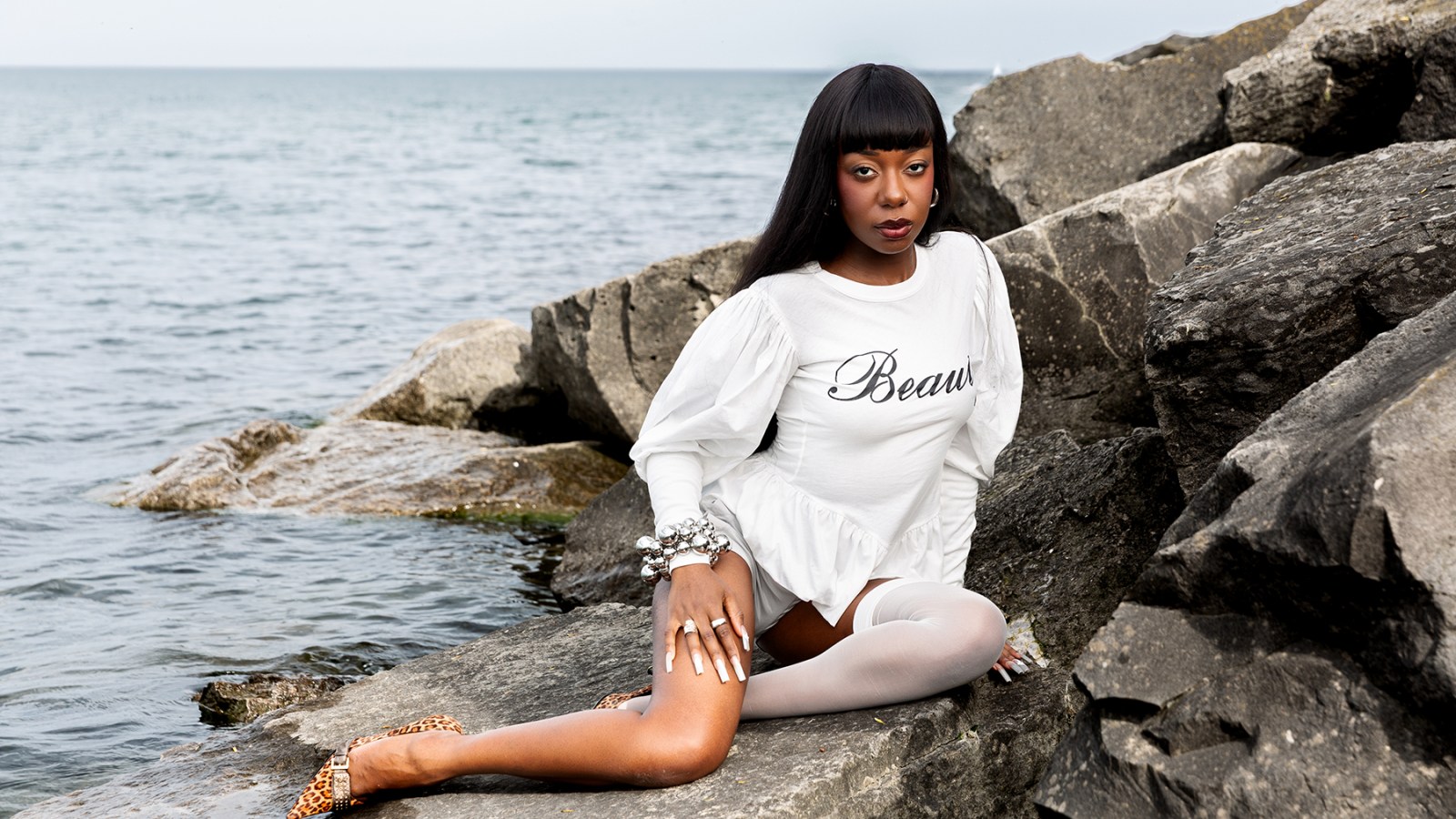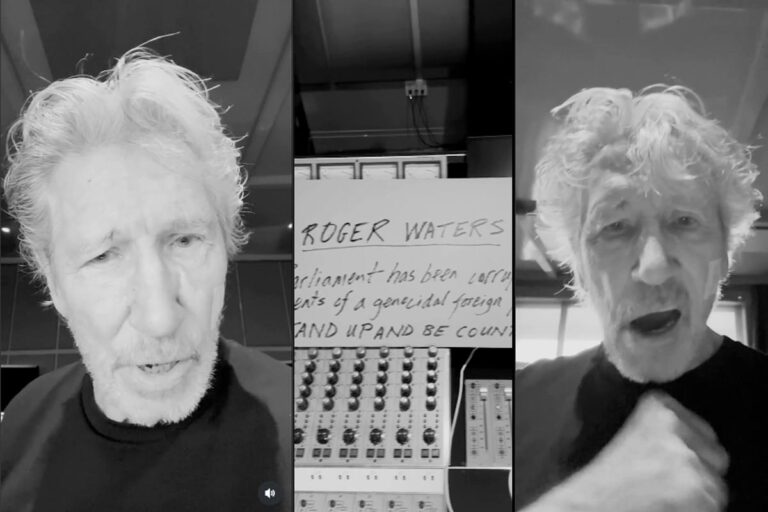Wandering through the streets of Detroit, Debby Friday sensed an absence around her. “There’s this very ghostly feeling,” the Nigerian-Canadian musician tells Rolling Stone over Zoom from her home in Toronto, “because you could feel that it was built for more people than live there now.” She was in town to work with the techno-rap trio HiTech during writing sessions for her second studio album, The Starr of the Queen of Life, out Aug. 1. “The geography of places informs the sounds that are made there,” she says. “When you hear a lot of Detroit techno, like the use of reverb, for example, you can hear that empty space.”
She adds that she notices a similar void cracking open during our conversation. “Even now, I can tell that I’m self-censoring,” Friday says, explaining that she feels an internal resistance towards explicitly detailing her ambitions. She reveals something similar on her latest single “Bet on Me,” where she sings, “I don’t write all my thoughts down/Scared of the permanence.” She usually keeps her manifestations in her head and fills the empty space with music, instead. “I’m scared to admit what it is that I actually want out of life,” she says. “Writing things down gives them a weight, it brings them into the material world. I’ve always had this fear — ever since I started making music — around wanting to admit my true desires around just what I want out of this.”
Resisting the urge to conceal and suppress is an ongoing challenge for Friday, but on The Starrr of the Queen of Life, she fights back and lets everyone in.
“I’ve shed some of this desire to obscure myself, because I think that was coming from a place of fear or shame around my own earnestness,” Friday says. “I’m so much more vulnerable in my songwriting, even in the way that I’m singing.” She previously resisted calling herself a singer because she never felt as though her tone aligned with the “beautiful, bright voices” she heard from other women. “But that’s not true. My natural singing intonation is actually to go into almost this falsetto, and you can hear it on this album,” she says. “I’m much more comfortable showing that part of myself to the public.”
It’s not as though Friday is unfamiliar with being in the spotlight. Her debut album, Good Luck, was awarded the Polaris Music Prize in 2023 and prompted an expansive headlining tour with a few festival appearances in the mix, too. It was undoubtedly successful. But it didn’t feel quite right. “I got to this place where I was like, it doesn’t feel like how I thought it would feel,” she says. “I just didn’t feel like myself. Something felt off about the trajectory that I was on.” She saw a disconnect between her professional and public life that threatened “to send me into a tailspin” if she didn’t balance it out soon.
In order to feel successful, Friday realized, she needed total freedom and control across the board. So she decided to manage herself throughout her second album cycle. “I know that eventually I’ll have another manager, but just doing this process on my own has taught me so much about myself, and it’s given me clarity in my vision as an artist,” she says. Learning to advocate for herself, and say no when necessary, revived her sense of agency as both an artist and businesswoman. She describes the decision as “one of the hardest things I’ve ever had to do.”
It also removed a sense of naïvete around her relationship with the music industry. “If you’re being exploited, if you’re not having a good time, and if you don’t feel like you’re able to express yourself and be creative in the way that you want just because of financial decisions that other people are making for you, I don’t think that that’s success,” Friday says. “That’s not something that I want for myself.”
The Starrr of the Queen of Life asks and answers the question, What do I want for myself? For starters, Friday wanted ample space and time to focus on her creative process without distraction. She waited until she was free from touring and holed up in a London studio with Australian producer Darcy Baylis. “We went out to dinner maybe twice,” she says. “It was true, like, boot camp, workhorse. That’s the way I like to work.” She barely got a chance to explore London, or hear how the city informs its sounds, the way she did in Detroit with HiTech and in Mexico City with Tayhana. It’s not like she would have been in the club, anyway. “I do not go out, like at all,” Friday says. “But I still feel very connected to that culture.”
At this point in her life, she prefers to stay home and make music for those nightlife spaces than to occupy them herself. She started “experimenting with pop music” — as well as what she calls “shoegaze dancehall” — and “flirting with DJing” more while making this record. “I stepped away from nightlife because it’s so intertwined with drug culture and stuff, and I just couldn’t be around that for the longest time,” she says. “When I was spiraling and having a really hard time before I got sober, it was discipline that changed me as a person, really saved my life, and stopped me from falling back into darkness in so many ways.”
Friday offers a multi-perspective interrogation of substance use on the album, recounting the highs and lows and the gray area in between. “I really wanted to channel this universal thing, because I understand that this is not an isolated experience,” she says. The Starrr of the Queen of Life is also full of love songs. “Here I go getting shy,” says Friday, who got engaged earlier this year. For the first time, she’s writing about true love, rather than pain and heartbreak. “I have my partner and I have this new experience of love that is just so much gentler and softer,” she adds. “There’s sweetness in this relationship, and there’s sweetness in my personal life.”
Friday might have been reluctant to express it before, but The Starrr of the Queen of Life is a declaration of her yearning to be a star — the truest, most creatively aligned version of herself, devoid of external pressures and perceptions. She wants to fill the empty space on her own terms with her own sounds.
Friday describes the record as “the most accessible album that I’ve ever made,” which was an explicit goal she set early on. “I don’t think it’s a crime to have mass appeal, as long as you stay centered in yourself,” she says. After Good Luck, she found herself wondering, “Am I going to reach these heights again? Am I going to surpass myself? Is my next work going to be as good as this?” They were impossible questions to answer on her own. She looked outward, instead.
“I’m a very spiritual person, and I like to think that I do get signs from the universe that I’m moving in the right direction, even if it’s things that are really hard,” Friday says. “It’s like, oh, this was actually for me, and this led me down the path that I needed to take. And I feel like this album was a really big sign for me to just keep going.”



